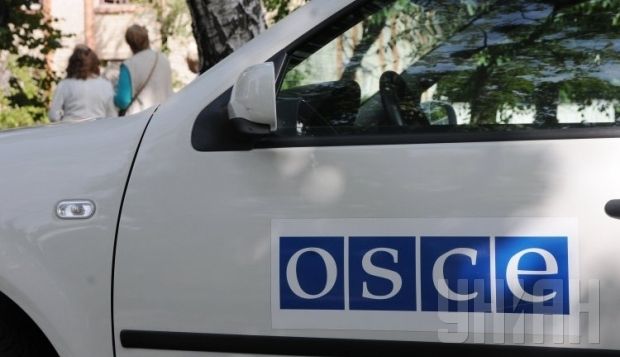
"We do not disclose the positions of the Ukrainian military," the head of the OSCE’s Special Monitoring Mission in Ukraine (SMM) Michael Bociurkiw said at a briefing in Kyiv.
The organization, charged with monitoring the situation in Ukraine’s Donbas comflict zone, had earlier revealed in its November 10 report that observers from the SMM had spoken about Ukrainian army positions to representatives of the Joint Centre for Control and Coordination (JCCC).
The JCCC is a group of Ukrainian and Russian military officers who monitor the fulfillment of the provisions of the September 5 Minsk Protocol on ending the conflict in the Donbas. It is not connected with the OSCE or its mission in Ukraine.
“The SMM informed the JCCC members about heavy artillery and tanks observed in the area of Karlivka [an area held by Ukrainian government forces - ed]. The SMM will continue to follow up with the JCCC,” the OSCE observers wrote in the November 10 report.
Bociurkiw said that the mission reports with an open mind and position of neutrality. However, he said it “could not hide certain actions.”
Reacting to the report of OSCE monitors providing military information to Russian army officers, Ukraine’s National Security and Defense Council said Ukraine was concerned about the disclosure by individual representatives of the OSCE monitoring mission of information on the deployment of Ukrainian units in the conflict zone. The council said it hopes that such incidents will not be repeated in future.
The OSCE was also involved in a row in Tuesday over claims by Ukrainian defense officials that Russian citizens made up 80% of the SMM’s monitors in Mariupol, a possible flashpoint in the conflict zone. Making the claim on Ukrainian television, Vasyliy Budik, a Ukrainian defense ministry advisor, said that the Russian SMM observers “have an extremely aggressive attitude towards our military,” and that the observers were"literally hunting for our artillery battalions."
OSCE spokesperson Cathie Burton responded to the claims on Twitter, tweeting “Factcheck: Out of 17 OSCE SMM monitors in Mariupol, Donetsk region, only one is Russian.”
The OSCE later told UNIAN that more than 40 countries, including Russia, have seconded monitors to the SMM, but that no single country accounts for more than 10% of the SMM’s staff. A source at the organization said that currently there are 295 members in the OSCE’s special mission to Ukraine, while next week there will be 319.
“The countries seconding the most monitors are Finland, Germany, Hungary, Poland, Russia, Romania, Sweden, the UK, and the United States,” the OSCE source told UNIAN.
“Out of 319 SMM members, there are 260 actual monitors, excluding support staff. One hundred and twelve monitors are deployed in the east,” the source said.
The source confirmed that in line with the mission mandate, there are no Ukrainian monitors in the SMM, but that 120 Ukrainians have been hired for support roles. Russia, which signed the Minsk Protocol peace agreement and is arguably a party to the conflict, has 18 monitors in Ukraine.
The source provided UNIAN with a breakdown of the numbers and deployment locations of the SMM monitors, including the number of Russians in each area:
Donetsk – 60 monitors (6 Russians, hereafter RF);
Luhansk – 40 (4 RF);
Lviv – 13 (1 RF);
Dnipropetrovsk – 26 (2 RF);
Odesa - 25 (0 RF);
Kherson – 22 (1 RF);
Kharkiv - 27 (1 RF);
Kyiv – 26 (1 RF);
Ivano-Frankivsk – 12 (1 RF);
Chernivtsi – 14 (1 RF).
The source said that the number for Donetsk included the one Russian SMM observer stationed in Mariupol.
The OSCE waved away Kyiv’s concerns that the Russian SMM monitors could be providing information to anti-government insurgents, in spite of the growing evidence of Moscow’s direct involvement in not only fomenting the unrest in eastern Ukraine, but in actively supplying the insurgents with tanks, artillery, ammunition and manpower.
“None of the OSCE monitors, regardless of their nationality, represent their countries, but the OSCE,” the OSCE said in a statement.
“The OSCE is not in the position to influence the situation; monitors just report what they see and establish facts.”

